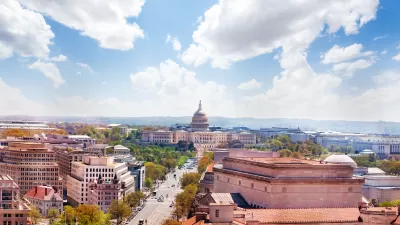A strange scene this week: members of Congress discussing height restrictions in one of the country's largest urban centers. In the end, a House committee approved a bill that would loosen D.C.’s century-old Height of Buildings Act.
The House Committee on Oversight and Government Reform has unanimously approved HR 4192, a bill that would allow the penthouse space of certain buildings to be used for human occupancy, reports Daniel J. Sernovitz. The bill will go before the full House next.
The process to approve the changes to the Height of Buildings Act of 1910 is a testament to the surreal governance of Washington. Committee Chairman Darrell Issa, who wanted the bill to go further in relaxing height restrictions, noted a deep rift between local political leaders on the changes. According to Sernovitz: “The National Capital Planning Commission voted 7-3 last fall in support of only minor changes, including the penthouse provision, while the District's planning office called for more relaxed standards and city council itself unanimously approved a ‘sense of the council resolution’ against any changes at all.”
Rep Issa’s, who wanted the bill to go further in loosening the height restrictions, offered this assessment on the city's incremental approach to loosening the height restrictions: "I'm deeply disappointed, but I understand that in this case, there may be some question about whether the city trusts itself with this responsibility…"
FULL STORY: House committee advances bill to raise D.C. Height Act

Planetizen Federal Action Tracker
A weekly monitor of how Trump’s orders and actions are impacting planners and planning in America.

Map: Where Senate Republicans Want to Sell Your Public Lands
For public land advocates, the Senate Republicans’ proposal to sell millions of acres of public land in the West is “the biggest fight of their careers.”

Restaurant Patios Were a Pandemic Win — Why Were They so Hard to Keep?
Social distancing requirements and changes in travel patterns prompted cities to pilot new uses for street and sidewalk space. Then it got complicated.

Platform Pilsner: Vancouver Transit Agency Releases... a Beer?
TransLink will receive a portion of every sale of the four-pack.

Toronto Weighs Cheaper Transit, Parking Hikes for Major Events
Special event rates would take effect during large festivals, sports games and concerts to ‘discourage driving, manage congestion and free up space for transit.”

Berlin to Consider Car-Free Zone Larger Than Manhattan
The area bound by the 22-mile Ringbahn would still allow 12 uses of a private automobile per year per person, and several other exemptions.
Urban Design for Planners 1: Software Tools
This six-course series explores essential urban design concepts using open source software and equips planners with the tools they need to participate fully in the urban design process.
Planning for Universal Design
Learn the tools for implementing Universal Design in planning regulations.
Heyer Gruel & Associates PA
JM Goldson LLC
Custer County Colorado
City of Camden Redevelopment Agency
City of Astoria
Transportation Research & Education Center (TREC) at Portland State University
Camden Redevelopment Agency
City of Claremont
Municipality of Princeton (NJ)



























